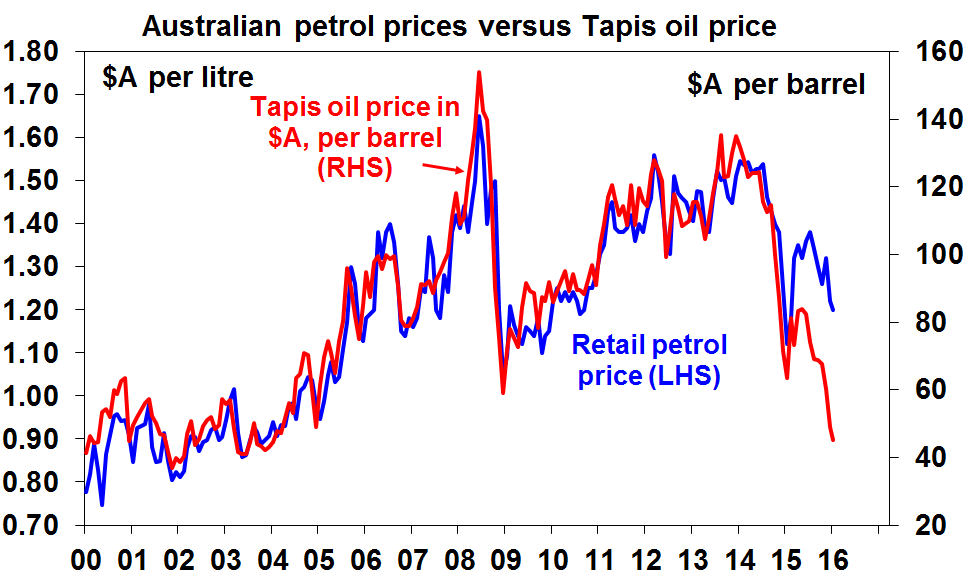Warning:
I'm no economist.
The
news here is that crude oil prices have declined 51 % since June.
It
seems to me that price messages and geopolitical events should by
right have driven prices back up.
Instead
of that they are falling rapidly - $30 a barrel and below.
This
means, together with all the other indicators (like all commodities
prices), the fall-off in world shipping that there is a major
fall-off in global demand although Saudi's games with Russia may also
have initially played a role.
This
is a rapidly-moving game.
Watch
this space.
Warning:
I'm no economist.
The
news here is that crude oil prices have declined 51 % since June.
It
seems to me that price messages and geopolitical events should by
right have driven prices back up.
Instead
of that they are falling rapidly - $30 a barrel and below.
This
means, together with all the other indicators (like all commodities
prices), the fall-off in world shipping that there is a major
fall-off in global demand although Saudi's games with Russia may also
have initially played a role.
This
is a rapidly-moving game.
Watch
this space.
Tanker Rates Tumble As Last Pillar Of Strength In Oil Market Crashes
13
January, 2015
If
there was one
silver-lining in the oil complex,
it was the demand for VLCCs
(as
huge floating storage facilities or as China scooped up 'cheap' oil
to refill their reserves) which drove tanker rates to record highs.
Now, as Bloomberg notes so eloquently, it appears the party is
over! Daily
rates for benchmark Saudi Arabia-Japan VLCC cargoes have crashed 53%
year-to-date to $50,955 (as
it appears China's record crude imports have ceased).
In
fact the rate crashed 12% today for the 12th straight daily decline
from over $100,000 just a month ago...
China
imported a record amount of crude last year as oil’s lowest annual
average price in more than a decade spurred stockpiling and boosted
demand from independent refiners.
China's
crude imports last month was equivalent to 7.85 million barrels a
day, 6 percent higher than the previous record of 7.4 million in
April, Bloomberg calculations show.
China
has exploited a plunge in crude prices by easing rules to allow
private refiners, known as teapots, to import crude and by boosting
shipments to fill emergency stockpiles. The
nation’s overseas purchases may rise to 370 million metric tons
this year, surpassing estimated U.S. imports of about 363 million
tons, according to Li Li, a research director with ICIS China, an
industry researcher.
But
given the crash in tanker rates - and implicitly demand - that "boom"
appears to be over.
Shipbroker
analysts blame fewer
January cargoes and oil companies using their own vessels for
shipment as
the main reasons for the dramatic decline. As Bloomberg adds,
Oil tanker earnings boomed thanks to the very thing that drove down crude prices: an abundance of supply that made ship-fuel cheaper and shipments plentiful. This month, shipbrokers report a slump in spot cargoes from the Middle East.
While they say it would be premature to suggest that has implications for the region’s output, the plunge in ratesshows just how sensitive owners are to monthly fluctuations in shipments.
The
good news after all this carnage is that, even before today's
plunge, collapsing
tanker rates were already pushing economics for floating storage (the
carry trade) closer to be proditable.
You
have to look for it, but it there. The SMH has live coverage of the
stock market rout -
Markets
Live: Investors rush to the exits
Oil
prices have dropped 51 per cent since June, 2015
The
crude oil rout, which pushed the spot price under $US30 for the first
time in 12 years, may be hurting the producers, but it's
delivering windfall
profits for Australia's four remaining oil refineries.
BP,
ExxonMobil, Caltex and new local player Viva Energy are
enjoying some of the strongest profit margins on refining for years,
in stark contrast to the bloodbathtaking
place in oil and gas production and expectations just 18 months ago.
While
crude oil prices have dropped 51 per cent since the end of
June, petrol priceshave
fallen about 15 per cent.
Retail
petrol prices in Sydney fell close to $1
a litre early
this month and have since risen despite the slide in crude oil
prices. Across the country, the price for regular unleaded petrol
averaged $1.22 a litre last week, up 2¢ from the first week of the
year, according to the Australian Institute of Petroleum.
One
of the beneficiaries is a large refinery in Geelong, which
commodities trader Vitol bought from Shell in early 2014 when most
expected the ageing, unprofitable plant to be forced to close. Vitol
owns Viva Energy, which operates the plant.
"Lower
oil prices and lower exchange rates have
overall been good for refining in Australia," Viva chief
executive Scott Wyatt said.
"A
high Australian dollar has been particularly challenging for
manufacturing businesses, so the currency
depreciation over
the last 12 months has certainly been a very welcome relief."
Refining
margins are set in Singapore and local
players have no control
over them. But margins on
retailing petrol and diesel have climbed and
were the highest in the September quarter since at least 2002, the
competition watchdog said last month.
The
findings triggered accusations of price-gouging that were roundly
rejected by the industry, which includes refineries that were
suffering heavy losses until recently.
The
weaker dollar, which traded at US70.13¢ on Wednesday, means the drop
in global crude prices hasn't been fully felt at the petrol pump.
Also, pump prices typically rise sharply when crude prices rise, and
then only show a slow decline as retailers try to undercut their
competitors, industry sources say.
Oil price in $A terms indicates petrol should be near 90 cents/litre. Big rise in refiner margins.See today's AFR p1




 Shane Oliver
Shane Oliver









No comments:
Post a Comment
Note: only a member of this blog may post a comment.